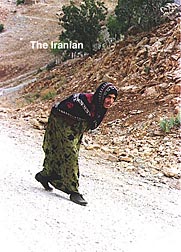
People of Oraman
Weathered by more than the elements
Written and photographed by Rasool Nafisi
December 18, 2000
The Iranian
Photos here
We were at the tail end of our journey in a hundred-mile-long valley
stretched along Iran-Iraq border. We were pretty tired and looking for
a rooftop to sleep on in Oraman. Someone suggested sleeping inside a mosque.
"No," I said. I felt it wasn't quite right to sleep in that little
mosque where the faithful frequented, hands clasped on the chest in Sunni
tradition, reciting their prayers with deep Kurdish accent.
We were not a very good mood. Our driver , a crossed-eyed man, silent
like the valley itself, speaking little Farsi, preferred driving on the
left side of the road, which not only faced oncoming traffic, but also
edged the abyss. Once I asked him if he had learned driving in England.
"No," he grunted, and continued to drive on the left side.
The gravel road was only twelve years old. The first generation of "Construction
Crusade" volunteers had built it in the early days of the revolution
with lots of faith and idealism. Some of them were killed by Iraqi mortars,
others during blizzards. This was my first opportunity to travel the road
and see the mysterious Oraman. But this man, this indifferent, dangerous
driver, was determined to get us all killed. And it drove me mad.
Ali, the head of the local cooperative had come along to help. He was
a robust man, in his forties, but his face, bruised by the elements, made
him appear a lot older. He was friendly and talkative. He seemed like the
right guy to ask about something I had been wondering about for some time:
Why are there are no herds and cattle in Oraman (Kurds pronounce the area
Howraman. Non-Kurds pronounce it Oramanat).
Ali smiled as if he was talking about some mischievous kids. "Because
of those who used to fight the government. For three and a half years,
insurgents of all sorts were here, fighting the Pasdaran militia and the
regular army. They used to bring truckloads of guns and ammunition from
Iraq and fight the government. Government people fought back from that
mountain. Neither came close. They just fired at each other from their
trenches. My brother was one of the insurgents, but I saved him. I saved
his life. I talked to a guy I knew in Tehran. I told him my brother is
naive. He didn't know any better. My acquaintance in Tehran promised to
give him a driving job at the Ministry of Agriculture. I secretly drove
him to Tehran. He is a driver there now. All others are dead. Seventeen
of them were caught right there where the road turns, trying to flee to
Iraq. Now, answering your question, how could you graze sheep and cattle
when there's a war going on? You were lucky to get out of your house and
come back alive."
"How do you manage now?" I asked. "The government gives
each of us seven kilos of flour every month. Some people bring a little
contraband from Iraq, Winston cigarettes and Whisky. You will see them
tonight." He was right. At about midnight, the mountain on the Iraqi
side was starry with Kurds bringing down their contraband, using their
flashlights. This was the town of Oraman Takht, once the capital of the
region. The village is laid on the side of the mountain, dirty unlike many
other villages on this stretch of forgotten land. I would say Hajij was
about the cleanest. It is the site of a shrine where families come to pay
their respects and pray, sleeping on rooftops of stone and mud houses.
There was no place to buy food, but inhabitants would take you in, and
share their meager diet with you. They were quite sure of who they were,
and knew quite well their tradition of hospitality and conduct with strangers.
There were no local jobs, so some of them traveled as far as Tehran or
Khuzestan to find jobs and bring money home. In one of the villages, a
man showed us a picture of himself playing a role in Samira Makhmalbaf's
recent film, "Blackboard", which was shot in his village. Did
he receive any wages for your work? "No," he said. He had played
in the movie for the fun of it, and the honor of his village.
Not far from Hajish, there is a waterfall where ice-cold water gushes
from the heart of the mountain. It is a rather unusual site considering
that the mountains of the region appear dry. Someone had built an old mill
there, and traces of a man-made waterway are still visible.
Our host, a young man from Hajish, traveled around to find work in dam
building. He said he isn't a strong believer in the Kurdish cause. "In
fact I like Fars (non-Kurdish) people better. I get along with them better.
I had an Armenian supervisor at a dam construction site in Khuzistan. He
is a gentleman (aaghaa). I consider him a close friend. I even send him
letters once in a while."
We also learned that someone had offered to build a bottling plant near
the waterfall to market the water in Kuwait. What was the village cut?
I asked. He had not thought of it. However, it could generate foreign currency
for the country, so that made him happy.
By now the gravel road had ended and we were on a smooth asphalt road
on our way to Sanandaj. That evoked demonic spirits in our crossed-eyed
driver. He drove as fast as our old Range Rover allowed, and on his favorite
side of the road, of course. Then it happened. A huge yellow truck appeared
on a bend. We were on a collision course. Our driver didn't make much of
an effort to change lanes. It was too late. But the truck driver showed
better judgment. He quickly turned to his left. He didn't even honk at
us. Click on images to see larger photos
 .
.
 .
.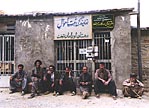
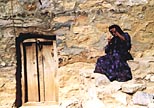 .
.
 .
.
 .
.
 .
.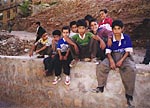
 .
.
 .
.
 .
.
 .
.
 .
.
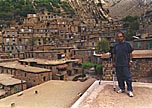


![]()